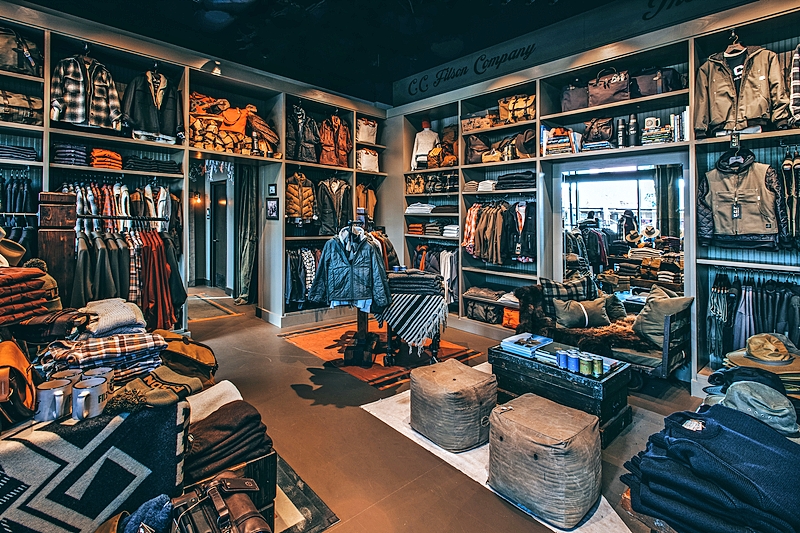Rugged Quality
By Naperville Magazine
November 2019 View more Shop
By Annemarie Mannion

Landing in Seattle in the 1890s was ideal timing for Clinton C. Filson, a former Nebraska homesteader and railroad conductor who became a purveyor of rugged outdoor wear sold to fortune hunters headed to Alaska during the Klondike Gold Rush. C.C. Filson’s Pioneer Alaska Clothing and Blanket Manufacturers, which opened in 1897, is still going strong, and today the company is simply known as Filson.
When the demands of prospectors for durable clothing faded, Filson continued to thrive by providing high-quality, dependable outerwear for hunters, anglers, and other outdoorsmen. Today, the store sells men’s and women’s clothing, luggage and bags, work clothing, and accessories, all designed to withstand even the harshest weather or treatment. Filson has recently expanded into selling clothing made from lighter weight, high-tech materials, as well as an expanded women’s line.
After opening the business’s 14th U.S. store in Naperville this fall (14 W. Jefferson Ave., filson.com), retail manager Jonathan Knobel discusses what makes Filson unique.
Why locate in Naperville when so many brick-and-mortar retailers are struggling?
There’s a gigantic following for Filson in this area; we can see that from our online orders. There is such history in [Naperville’s] downtown. It is an old, historic place and that fits well with our company.
For years most of our business was wholesale. But now we’ve had such success with our retail stores. People really like seeing the products in person—they make such a good impression. As old as we are as a company, we’re still, in some ways, like a startup in terms of our physical retail stores.
Why do you think shoppers seek out the brand?
A: In contrast to the push for people to buy really inexpensive products online without really thinking about it, we’re seeing a huge trend of people who want quality products and high-quality outdoor wear. They’re dancing to our tune.
Sustainability has become more of a factor for people who are concerned about the environment. If you replace an item once instead of buying 10 replacements, that’s a big thing and it’s good for the environment.
What are some of your products people might know?
We used to outfit the U.S. Forest Service, and we still sell their jacket that we’ve been making since the 1920s. It is called the Mackinaw wool cruiser and it’s made in the U.S. All of our heritage products are made in the U.S. It sells for $395.
Do you offer lighter weight outdoor wear?
We started about five years ago. That was to answer the demand of people who were saying, “Hey guys. I’d love to buy a nylon rain jacket from you.” When people are packing ultralight or running a marathon, we don’t expect them to pack a waxed cotton jacket. The Skagit jacket ($495) is a great foul-weather jacket. It has neoprene cuffs, which is like wetsuit material. It keeps moisture from going in your sleeves.
What is the decor of your new store like?
We want people to feel like they’re in their friend’s cabin. We have accents in the store—hand-carved eagles and fish—that are made by craftsmen in the Pacific Northwest. Our stores always represent where we come from and the products we’ve been making for so long.
What else makes your products unique?
We offer a lifetime guarantee. If you’ve had one of our jackets for 10 years and the zipper breaks, we’ll fix it. Or, if it can’t be fixed, we’ll replace it. We stand by our products and it costs nothing [for the consumer]. It’s part of what you get when you make a purchase.
Photos Courtesy Filson


